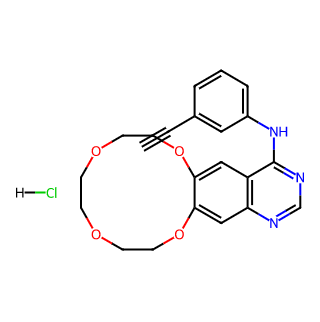- Synthetic anti-infective drugs
- Medications for the digestive system
- Antipyretic and analgesic drugs
- Medications for the blood system
- Medications for the respiratory system
- Anti-allergic drugs
- Medications for the urinary system
- Diagnostic medications
- Immunosuppressive and immunomodulatory drugs
- Vitamins and mineral supplements
- Antioxidants and medications for osteoporosis
- Antiparasitic drugs
- Ophthalmic medications
- Amino acids and their derivatives
- Dermatological medications
- Medications for the circulatory system
- Antitumor drugs
- Medications for the nervous system
- Hormonal and endocrine function-regulating drugs
- Antibiotics
- Others
CAS Number: 1204313-51-8




I. Basic Information
Product Name: Icotinib Hydrochloride
CAS Number: 1204313-51-8 (alternatively, 610798-31-7, which may vary depending on the manufacturer or preparation process)
Molecular Formula: C22H22ClN3O4 (considering the hydrochloride radical, it is C22H21N3O4·HCl)
Molecular Weight: 427.881 (alternatively, 391.427, which is the molecular weight without considering the hydrochloride radical)
II. Physical Properties
Appearance: White to off-white solid
Solubility: Insoluble in water, but soluble in DMSO and ethanol (requires ultrasonication)
Boiling Point: 581°C (some sources do not mention a specific boiling point)
Density: 1.31 (some sources do not mention a specific density)
Flash Point: 305°C (some sources do not mention a specific flash point)
Storage Conditions: Should be stored at 2~8°C or -20°C, protected from light, moisture, and kept tightly closed and dry.
III. Pharmacological Properties
Mechanism of Action: Icotinib Hydrochloride is a tyrosine kinase inhibitor of EGFR, which selectively inhibits EGFR and its mutants, without significant inhibition of other kinases.
Pharmacodynamics: At the cellular level, Icotinib Hydrochloride inhibits EGFR tyrosine kinase-mediated intracellular protein tyrosine phosphorylation, thereby inhibiting the proliferation of tumor cells.
Pharmacokinetics: After oral administration, Icotinib Hydrochloride is primarily metabolized by the liver, with multiple metabolites present. Its pharmacokinetic parameters are not significantly different between healthy volunteers and cancer patients. Moderate and high-fat meals can significantly increase its absorption.

Tai Yau Street, San Po Kong, Kowloon, Hong Kong, China.



